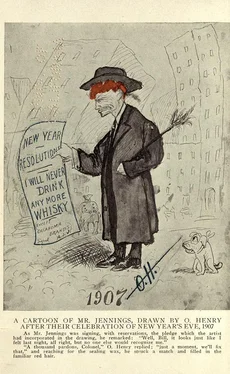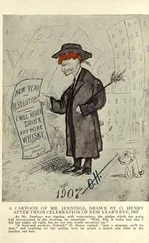Al Jennings - Through the Shadows with O'Henry
Здесь есть возможность читать онлайн «Al Jennings - Through the Shadows with O'Henry» весь текст электронной книги совершенно бесплатно (целиком полную версию без сокращений). В некоторых случаях можно слушать аудио, скачать через торрент в формате fb2 и присутствует краткое содержание. Жанр: Биографии и Мемуары, на английском языке. Описание произведения, (предисловие) а так же отзывы посетителей доступны на портале библиотеки ЛибКат.
- Название:Through the Shadows with O'Henry
- Автор:
- Жанр:
- Год:неизвестен
- ISBN:нет данных
- Рейтинг книги:5 / 5. Голосов: 1
-
Избранное:Добавить в избранное
- Отзывы:
-
Ваша оценка:
- 100
- 1
- 2
- 3
- 4
- 5
Through the Shadows with O'Henry: краткое содержание, описание и аннотация
Предлагаем к чтению аннотацию, описание, краткое содержание или предисловие (зависит от того, что написал сам автор книги «Through the Shadows with O'Henry»). Если вы не нашли необходимую информацию о книге — напишите в комментариях, мы постараемся отыскать её.
Through the Shadows with O'Henry — читать онлайн бесплатно полную книгу (весь текст) целиком
Ниже представлен текст книги, разбитый по страницам. Система сохранения места последней прочитанной страницы, позволяет с удобством читать онлайн бесплатно книгу «Through the Shadows with O'Henry», без необходимости каждый раз заново искать на чём Вы остановились. Поставьте закладку, и сможете в любой момент перейти на страницу, на которой закончили чтение.
Интервал:
Закладка:
Then it would begin all over again, Carnot protesting that any man who would salute him as an exconvict would be shot on the spot. No man dreaded the thought of that stigma more than Porter. We had many talks about it. He hid his feeling under a light banter.
Once in a while the veneer cracked. The day I told him about the ugly tragedy of Big Joe, a Greek Indian of the "Buck Gang," I thought he was going to faint. His face was usually quiet and enigmatic in its expression. This day it got ashen and rigid. He said nothing for a moment. Then with a flash he turned the subject. Old Carnot would not have it. There was almost an open breach between them.
Big Joe had been sick at the hospital for months. One night the word went around that he had croaked. A burglar friend of mine, on patrol duty at the hospital, came over to the post-office.
"Jennings, come along over to the ward with me. I want to show you something," he said mysteriously.
"What's up?"
"They've got Big Joe tied up ready for the wheel-barrow and he isn't dead."
"Hell, no!"
"Come over and see."
I went in with him. Big Joe was lying in his cot, his feet tied together, a handkerchief over his eyes.
"Look, the burglar whispered. He took out his penknife and pricked the Indian on the foot. The knee drew up, the man twitched to his neck. It made me sick with repulsion. I went over to Porter.
"Big Joe isn't dead," I said. "Tell the croaker."
"The damn' hellions know it," Porter hissed. "I told him. They'd like to bury us all alive. Damn them, I'll get them yet."
He turned his back and rushed off. I went back to the cot where the Indian's body lay.
Porter came back with the night doctor. Big Joe had already opened his eyes. As the croaker took up his wrist to feel his pulse he yanked himself suddenly to one side.
"Drink—water!" The broken mumble seemed to splinter the air. The four of us stepped back with the shock of this whisper from the lips of the man tied up as dead.
The doctor himself pulled off the straps. The burglar ran for the water. I went back to the post-office.
The next night Big Joe had another fit.
"He's dead this time." The croaker was still shaky from his recent experience. "Let him stay dead. I don't want any of you damn' meddlers to monkey with him."
The gigantic body, yellow and emaciated, was carted to the dead house and laid in the bottom of the trough. This trough stood on the cement floor and was about three feet deep. The stiff was placed on it and cracked ice scattered over it. The body was kept a day. If no friends called for it the doctors held a dissecting symposium—what was left of the bones was dumped into a rough board box and stuck into a hole in the prison graveyard.
It was a Saturday night when Big Joe kicked off. The night porter used to go whistling by the post-office, jogging the wheelbarrow to the dead house. He would stop for a word with Billy and me. We would look out. Sometimes there would be one stiff with its arms and legs dangling over the sides of the cart. Sometimes there were two or even three.
"Big Joe done got it fob shuah dis time," he sang out to us, and clattered blithely on.
There was something callous and appalling about the prison attitude to the stiffs. The men were treated as so much refuse—they got no more respect than a dead dog. Big Joe's "comeback" had given me an odd twist. I felt spooky, bitter, depressed.
I went over to the dead house on Sunday morning. Curiosity drew me. It was just a dark shack, 'way off near the gas house. The patrol guard went with me. We pushed the door to.
The horror of the thing struck upon us. It was revolting as thought a cold clammy hand reached up from that trough and smeared us with blood. A kind of strangling sensation caught me. The guard hung to my waist, his teethchattering. Big Joe had been placed in the bottom of the trough. He had "come to" again.
He had awakened in the dead house in the middle of the night. He had tried to climb out. His clawing, terrible, long arms were flung forward. His body hung over the board, his head resting on the cement, as though he had lost his balance and half toppled out. The face, one cheek pressed against the ground, was twisted toward us the mouth agape, the eyes staring.
I went over to the club shortly after 12. Louisa and Porter were in the little box kitchen. Louisa had his dishrag apron tied about him. Porter, inmaculate in the prison gray, was wearing a rich blue necktie.
The clerk in the State shop used to make us presents in return for favors. We wore the finest grade of underwear; we had good white shirts. Except for the black stripe on the trousers we could look like "dandies" on occasions. It was always an occasion for Porter. Even in his blackest moods and he had many of them in prison—he was fastidious about his appearance.
Louisa and Porter were scrapping like a couple of old women over the roast. Porter was a bit of an epicure, and there was many a heated argument over culinary niceties.
"Here, taste it, then," the chef jabbed the spoon between Porter's teeth.
"A little more celery salt," Porter smacked his tongue against the roof of his mouth, paused a moment after the manner of the queen's taster, and gave his opinion.
"Now here, I measured it three times." Louisa produced the cook book to prove it.
"That is no proof. You should have an apothecary's scale and weigh the ingredients," Porter was in one of his bubbling, irrepressible moods. "Let the colonel judge between us." He turned to me, and stopped, with the spoon clanking to the floor. "By God, Al, what ails you?"
I said nothing for a moment. We were seated about the table. They pressed me. I told them about Big Joe. I couldn't seem to keep it to myself. Porter jumped up and slammed his chair against the wall. Old Carnot commenced to sputter.
"We should write to the President of the United States about it." Carnot would never stoop to any lesser authority. "It is an outrage."
Porter came back to the table, the explosive, unusual outburst over. He drew in his lip and coughed—a habit of his.
"I think the summer will be quite warm," he offered.
Carnot would not have it.
"Mr. Porter, yon should exercise your best ability as a writer on this subject. You should enkindle the world about it. You should put it in an article and send it broadcast."
Porter's cold look would have chilled the ardor of any other suggestion-giver.
"I do not understand you, sir," he answered frigidly. "I am not here as a reporter. I shall not take upon myself the burden of responsibility. This prison and its shame is nothing to me."
He got up and walked into the kitchen. I followed him. "There are some obnoxious people here." His voice was stifled with resentment. "We should eliminate them."
It was one of the few times that I ever saw Bill Porter openly ruffled. He despised tips from men of Carnot's caliber. He never wanted any one to point out a story to him. He had to see the thing himself. As he says in "The Duplicity of Hargreaves"---"All life belongs to me. I take thereof what I want. I return it as I can."
With Billy Raidler and me it was quite different. Porter liked us. He would sit in the post-office and deliberately draw out from us accounts of the outlaw days. He would get us to describe the train-robbers, he would deftly prod us into giving elaborate details even to the very slang expressions the men had used in their talk. I never saw him take a note, but his memory was relentless.
The day I told him about Dick Price, a fellow-convict, he sat quiet for a long time.
"That will make a wonderful story," he said at last.
Dick Price is the original of the immortal Jimmy Valentine.
Porter came into the post-office just after the astounding feat had been accomplished. Dick Price, the warden, and I had returned from the offices of the Press-Post Publishing Company, Price had opened the safe in 10 seconds.
Читать дальшеИнтервал:
Закладка:
Похожие книги на «Through the Shadows with O'Henry»
Представляем Вашему вниманию похожие книги на «Through the Shadows with O'Henry» списком для выбора. Мы отобрали схожую по названию и смыслу литературу в надежде предоставить читателям больше вариантов отыскать новые, интересные, ещё непрочитанные произведения.
Обсуждение, отзывы о книге «Through the Shadows with O'Henry» и просто собственные мнения читателей. Оставьте ваши комментарии, напишите, что Вы думаете о произведении, его смысле или главных героях. Укажите что конкретно понравилось, а что нет, и почему Вы так считаете.











